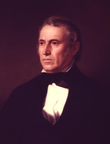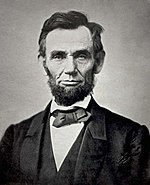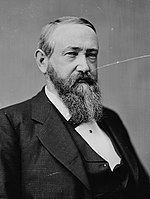The
"election" of President John Q. Adams in 1824 is
one of the most interesting elections in presidential history.
Besides not receiving the majority of the popular vote (he only got
30.9%) he also he didn't get the majority of the electoral votes
either. In fact Andrew
Jackson technically
won the election, but because he didn't win the majority of the
electoral votes either, the decision on who would become the was
thrown to the House
of Representatives,
who ultimately voted for John Q. Adams.
This
election was also the last one in which
the Democratic-Republicans participated
in due to infighting and the eventual splitting up of the party into
the Democratic
Party and
the National
Republican Party over
the results.
Despite beating Henry
Clay with a clear majority of the electoral vote in the
presidential election of 1844, James K. Polk actually only won 49.5%
of the popular vote (Clay won 48.1%). The reason for this is because
a third presidential candidate, a James
G. Birney of the Liberty
Party, won 2.3% of the popular vote, and might have cost Clay
the presidency, because the Liberty Party was an abolitionist party,
and the political party that Clay was running for president under,
the Whig
party, opposed the expansion of slavery (although not
outlawing it).
In
1848 Zachary Taylor became the second person of the Whig party to be
elected President of the United States. He also did it after only
wining 47.3% of the popular vote. Probably the only reason why he
didn't actually get the majority of the popular vote was because of
former president Martin
Van Buren,
who ran for president again under the Free
Soil Party ticket
(an anti-slavery expansion party).
The
election of 1856 was the first election in which the Republican
party ran
a candidate for president (that being John
C. Fremont).
Of course, Fremont did not win the election, James Buchanan did, but
he only won 45.3% of the popular vote. The reason why neither
candidate won the majority of the of popular vote is because of
former president Millard
Fillmore,
who ran under the Know-Nothing party in that election and won 21.6%
of the popular vote (although who actually would have won if
the Know-Nothing
party had
not ran a candidate for president is unknown).
Despite
being one of the most famous presidents in United States history, in
the 1860
presidential election Abraham
Lincoln only won 39.8% of the popular vote. In fact the only reason
he won was because there were three other major presidential
candidates running for president (including two Democrats).
Lincoln
was also greatly hated in the south. He wasn't even on the
ballot throughout most of the south, and his election was the tipping
point for the start
of the Civil War.
Not
only did Rutherford B. Hayes win the presidential
election of 1876 with
only 47.9% of the popular vote, he's actually the only person to win
a presidential election when someone else (Samuel
J. Tilden)
actually won the majority of the popular vote (that being 50.9%).
James
A. Garfield barely beat Winfield
S. Hancock in
the presidential
election of 1880,
and he barely got more of the popular vote than Scott did. In fact
Garfield only got 48.3% of the popular vote, while Hancock got 48.2%
of the popular vote.
In
fact it's even possible that Hancock may have lost due to James
B. Weaver of
the Greenback
Party (who
won 2.3% of the popular vote) winning votes that probably would have
gone to Hancock.
Grover Cleveland has had a very interesting presidential election history. Not only is he the only person to hold two non-consecutive terms as president, he also didn't win the majority of the popular vote in either of the elections he won (48.9% in 1884, and 46% in 1892)
In the presidential election of 1888 Benjamin Harrison, while he might have defeated President Grover Cleveland in the electoral college (and the election itself) he didn't win the popular vote. In fact he only won 47.8% of the popular vote, while Cleveland won 48.6%.








